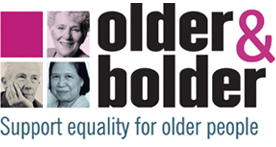Older & Bolder closed June 2013 This is an archived website
Older & Bolder Demands Meaningful Consultation with Older People on National Positive Ageing Strategy [08/12/08]
Older and Bolder says that the Government must honour its commitment in the Programme for Government to engage in meaningful consultation with older people on the proposed National Positive Ageing Strategy. This is according to Patricia Conboy, Older and Bolder Project Director, who was speaking at Nothing About Us Without Us conference today (Monday, 8 December) in Dublin’s Gresham Hotel.
The conference, which was attended by the Minister for Older People, Máire Hoctor TD, is taking place on the eve of the first meeting of the Inter-Departmental Group of senior civil servants charged with managing the process of developing the National Positive Ageing Strategy.
Older and Bolder is an alliance of eight non-governmental organisations in the ageing sector who are committed to a joint campaign for the development and implementation of the National Positive Ageing Strategy. The members of the alliance are: Active Retirement Ireland, Age and Opportunity, Age Action Ireland Ltd., Alzheimer Society of Ireland, Carers Association, Irish Hospice Foundation, Irish Senior Citizens Parliament and the Senior Helpline.
Patricia Conboy described the Government’s recent decisions around the medical cards for over-70s as "policy-making on the hoof". She said that the response from older people and the wider community to these decisions has shown Government what can happen when major policy change is introduced without effective consultation and communication.
"Older people will no longer sit back and let the Government make key decisions that impact strongly on their lives without proper and effective consultation. We, in Older and Bolder, do not want see to see Government repeat the same mistakes with the National Positive Ageing Strategy. This is why we are calling on the Government to honour the commitment they made in their own Programme to engage in meaningful consultation around the Strategy".
Patricia Conboy explained that Older and Bolder has recently submitted a paper to Government setting out what is required by way of meaningful consultation including:
- Clear and transparent Terms of Reference for the consultation;
- A high visibility campaign by Government, including a regional "roadshow", to heighten public awareness of the National Positive Ageing Strategy;
- A public commitment by the Minister for Older People to proactively listen and respond to the views expressed by older people.
- An inclusive approach to the consultation that will take account of the particular barriers to participation experienced by vulnerable groups of older people i.e. people with dementia, in nursing homes, with significant disability or frailty.
"Older people will have more confidence in the consultation process if it incorporates a mechanism for public accountability. This should include the provision of written public feedback on responses to core questions posed during the consultation and an analysis of key themes emerging from the process."
Speaking at the same conference, Professor Andrea Louise Campbell (Massachusetts Institute of Technology), revealed that universal social provision programmes – like universal access to medical cards – have helped to transform the political participation of older people in the United States.
"In America, universal programmes in social security and healthcare have helped to create a powerful political constituency and have transformed seniors from being the least politically active group in society to becoming the most active. Before these programmes were put in place older people in the US experienced high poverty rates and they had little access to health insurance. Now there is universal coverage and as a result poverty rates have fallen and the health status of older people has improved.
"These programmes positively affected older people’s political participation by providing older people with financial and health resources they didn’t have previously. Seniors also now have a direct stake in government policy and an incentive to participate in order to protect these programme. Indeed, older people’s participation in elections has dramatically increased. In 1952, older people made up 13% of those who voted in that year whereas they comprised 20% of those who voted in 2000".
Professor Campbell pointed out that older people in America have been very vigilant and successful in campaigning to protect these programmes from proposed cutbacks including the proposed privatisation of the social security system.
FOR FURTHER INFORMATION, PLEASE CONTACT:
Elaine Ryan, Montague Communications, (01) 830 3116 or (087) 295 1096.










